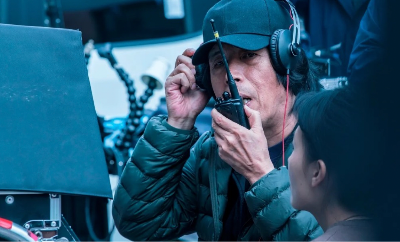Lead actors shine in psychological drama
Related Story
Left to right: Melissa Benoist as Nicole and Miles Teller as Andrew/ Courtesy of Sony Pictures Classics
The film “Whiplash” features a recurring story told about the time Charlie “Bird” Parker messed up during a music performance, which caused drummer Jo Jones to nearly decapitate him by throwing a cymbal at his head. Writer-director Damien Chazelle evidently used the story as an influence for the film’s grim tone, a foreboding one that hovers over the relationship between young jazz drummer Andrew (Miles Teller) and his heartless conductor Terence (J.K. Simmons).
What “Black Swan” did for ballet, “Whiplash” does for jazz music. In fact, besides the hallucinations and kinky sexual content featured in “Black Swan,” “Whiplash” has a similar feel and overall story arc — a young New York City artist striving for perfection in his or her craft at whatever cost who is under the tutelage of a ruthless trainer.
The film starts with Andrew, ambitious jazz drummer at a prestigious music school. After Terence, the conductor for the school’s competitive jazz band, sees Andrew’s drumming skills, he asks him to be the core drummer. Andrew risks his personal life, sanity and even well-being to become this generation’s Buddy Rich.
Chazelle immerses viewers in a world that at first may seem unbelievable, given Terrence’s abusive behavior. Although certainly tense, the fast editing causes certain characters to feel underdeveloped, leading viewers to suspect that necessary information was lost.
Yet, the film hooks viewers with tension, creating anticipation for the outcome of each main character’s arc. It is not just Chazelle’s solid direction and well-written script that makes the film great. Watching Teller and Simmons deliver career-best performances adds to “Whiplash’s” overall intensity.
Particularly with the character of Terence, viewers may find themselves wondering why the school board never penalizes the conductor’s sadistic methods. Then, the film skillfully delivers on that notion in the third act. Terence tells Andrew, “There are no two words in the English language more harmful than ‘good job.’” At first, Terence seems like Sgt. Hartman from “Full Metal Jacket,” who wants to dehumanize individuals and make them his slaves. But viewers begin to realize that Terence wants a musician to become the best at his craft, even if it means stepping out of one’s comfort zone in the most extreme ways.
Then there is Teller, who is known for his portrayals of grounded yet affable characters. While there are small parts throughout the film where he plays to those strengths, the scenes involving his character’s descent into madness allow Teller to push the boundaries of his acting skills. Though more understated than Simmons, Teller still delivers, while also convincingly playing the drums without a stunt double for the majority of the film.
“Whiplash” is one of this year’s best films. There are no hallucinations, nightmares, ghosts or anything one would expect from psychological horror that verges on a traditional horror film. Even so, viewers will find themselves on the edge of their seats for 106 minutes, which is exactly what Chazelle wants.
A version of this article appeared in the Wednesday, Oct. 7 print edition. Email Zack Grullon at [email protected].


















































































































































